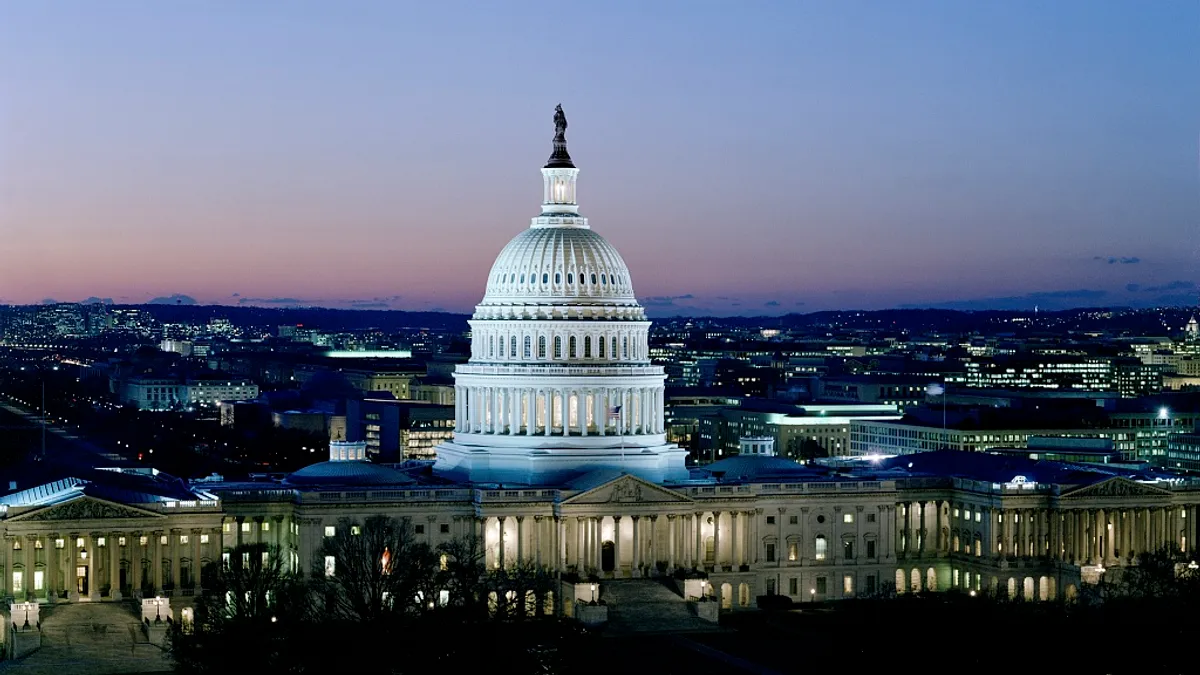UPDATE: March 27, 2020: President Donald Trump signed the Coronavirus Aid, Relief, and Economic Security Act into law Friday afternoon shortly after it passed in the House via a voice vote.
Dive Brief:
- A $2 trillion coronavirus relief deal cleared by the Senate Wednesday does not include the funding needed for labs to sustain a much-needed ramp-up of U.S. coronavirus testing, the American Clinical Laboratory Association argued late Wednesday.
- The bill throws the industry a bone in adjusting timing on the reporting period for private payer data and phase-in of reimbursement cuts under the Protecting Access to Medicare Act, which has reduced how much CMS pays for testing. The Coronavirus Aid, Relief, and Economic Security Act or CARES puts a scheduled payment cut on hold in 2021 for a year.
- Congress wants to make COVID-19 tests available to Americans free of charge — but free comes at a potentially unsustainable cost to labs, ACLA said. President Julie Khani warned in a statement: "Our members remain in an untenable situation, absorbing growing, uncompensated costs for testing specimens with no assurance that they will be appropriately or fairly reimbursed for all the tests they are performing."
Dive Insight:
The labs lobby group had asked Congress for $5 billion to ease costs related to uncompensated COVID-19 testing and rapidly scaling up capacity, and to guarantee government buyback of the equipment and supplies being used to expand testing availability, like high-throughput platforms.
"If Congress fails to designate essential emergency funding for clinical laboratories to support our efforts, labs will soon be forced to make difficult decisions about whether they can keep building the capacity our nation needs," Khani said late Wednesday.
According to a breakdown of the bill from the Senate Committee on Health, Education, Labor, and Pensions, it contains $11 billion for diagnostics, treatments and vaccines and $16 billion for the Strategic National Stockpile via the Public Health and Social Services Emergency Fund. Separately, $80 million is going to FDA for diagnostics, treatments and vaccines.
Sen. Chris Murphy, D-Conn., a member of the HELP Committee, suggested some of the $100 billion allocated to hospitals could be used to support testing efforts.
Reading the bill now. It’s full of funding that will help us turn the corner on Coronavirus.
— Chris Murphy (@ChrisMurphyCT) March 26, 2020
One ???? though: no specific funding to help labs increase testing capacity. Government is going to increase that capacity - by a lot - and that takes money.
Major unfinished business.
Navigating changes from PAMA was a main focus of the industry prior to the novel coronavirus emergency. The reduction cap was set to rise to 15% in 2021. The bill's one-year freeze on looming big cuts to common lab test reimbursement, which ACLA said will ultimately average roughly 30%, was a welcome addition.
The bill stipulates all COVID-19 testing, including those not yet awarded emergency use authorization by FDA, be covered by private insurers without patient cost sharing. Additionally, in cases when providers and insurers are not contracted, providers must disclose their testing prices.
State Medicaid programs have the option to offer COVID-19 testing to uninsured individuals with no cost sharing. And under Medicare Part B, beneficiaries can also receive testing with no cost-sharing. CMS first set pricing for commercial tests weeks ago.
ACLA said Wednesday afternoon its members had reported out about 338,000 tests to date, with the number of daily tests rising to 57,000 on Tuesday. Those numbers are largely drawn from Quest, LabCorp, Mayo Clinic Labs, Opko Health's BioReference Laboratories, Sonic Healthcare and ARUP Labs.
The CARES Act passed 96-0 in the Senate and is expected to be greenlighted by the House of Representatives and President Donald Trump by week's end. Congress is then set to go on recess through April 20.











